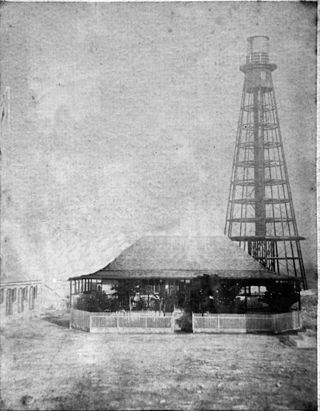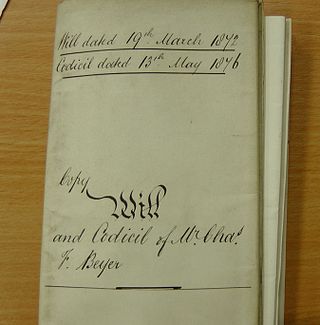| Cooper v Phibbs | |
|---|---|
 | |
| Court | House of Lords |
| Decided | 31 May 1867 |
| Citations | [1867] UKHL 1, (1867) LR 2 HL 149 |
| Keywords | |
| Contract, mistake | |
Cooper v Phibbs [1867] UKHL 1 is an English contract law case, concerning the doctrine of mistake.
| Cooper v Phibbs | |
|---|---|
 | |
| Court | House of Lords |
| Decided | 31 May 1867 |
| Citations | [1867] UKHL 1, (1867) LR 2 HL 149 |
| Keywords | |
| Contract, mistake | |
Cooper v Phibbs [1867] UKHL 1 is an English contract law case, concerning the doctrine of mistake.
Cooper's uncle, not intending to misrepresent anything, but being in fact in error, told Cooper that he (the uncle) was entitled to a fishery. [1] Cooper, after his uncle's death, acting in the belief of the truth of what his uncle had told him, entered into an agreement to rent the fishery from the uncle's daughters. However, the fishery actually belonged to Cooper himself. After the uncle died, the lease was renewed through Cooper's aunt, via her three daughters, Cooper's cousins, and Mr Phibbs acting as their agent. The aunt, three sisters, and Cooper, had all assumed that they were entitled to the land through a right of inheritance. In fact, Cooper was truly entitled to an equitable residual interest, because the uncle in his will had granted Cooper a life tenancy. When the sisters asked for the next rental payment, this had transpired and Cooper sought a declaration that he was the owner and that the lease was not enforceable.
The House of Lords held that the contract was voidable at Mr Cooper’s instance, on the basis of a mistake that it was possible for the aunt and sisters to lease the land to Mr Cooper. Since Mr Cooper was the true beneficial owner, in equity, it was impossible for a lease to be granted to him in law.
Lord Cranworth said the following.
The consequence was, that the present Appellant, when, after the death of his uncle, he entered into the agreement to take a lease of this property, entered into an agreement to take a lease of what was, in truth, his own property – for, in truth, this fishery was bound by the covenant, and belonged to him, just as much as did the lands of Ballysadare; therefore, he says, I entered into the agreement under a common mistake, and I am entitled to be relieved from the consequence of it.
In support of that proposition he relied upon a case which was decided in the time of Lord Hardwicke, not by Lord Hardwicke himself, but by the then Master of the Rolls, Bingham v. Bingham , [2] where that relief was expressly administered. I believe that the doctrine there acted upon was perfectly correct doctrine; but even if it had not been, that will not at all shew that this Appellant is not entitled to this relief, because in this case the Appellant was led into the mistake by the misinformation given to him by his uncle, who is now represented by the Respondents. It is stated by him in his Cause Petition, which is verified, and to which there is no contradiction, and in all probability it seems to be the truth, that his uncle told him, not intending to misrepresent anything, but being in fact in error, that he was entitled to this fishery as his own fee simple property; and the Appellant, his nephew, after his death acting on the belief of the truth of what his uncle had so told him, entered into the agreement in question. It appears to me, therefore, that it is impossible to say that he is not entitled to the relief which he asks, namely, to have the agreement delivered up and the rent repaid. That being so, he would be entitled to relief, but he is only entitled to this relief on certain terms ...
...
... what are the terms upon which this relief is to be given? Now, the Respondents allege that their father, Edward Joshua, in making the canals and other works necessary for establishing the fishery, and also in purchasing up fishery rights in the bay, expended very large sums of money.
First of all he was at the expense of obtaining the Act of Parliament. ... He was at great expense in purchasing up the rights of fishery of different proprietors on the banks, and he was at very large expense in making cuts and removing obstructions, so as to make the fishery available. That, at least, is the allegation of the Respondents. Now, if that is so, the question is, upon what terms ought this relief to be granted? It is impossible to decide the merits of this claim in the absence of the persons entitled to the corpus of the estate. ... justice would not be done to them if we were to give relief to the Appellant by simply setting aside the agreement on which they claim a lien. They have a right to have that question disposed of. I submit to your Lordships, therefore, that all that we can do is to remit the case to the Court of Chancery in Ireland, with declarations which shall enable the parties to have this question properly decided.
Lord Westbury agreed, and expressed the issues as follows:
The result, therefore, is, that at the time of the agreement for the lease which it is the object of this Petition to set aside, the parties dealt with one another under a mutual mistake as to their respective rights. The Petitioner did not suppose that he was, what in truth he was, tenant for life of the fishery. The other parties acted upon the impression given to them by their father, that he (their father) was the owner of the fishery, and that the fishery had descended to them. In such a state of things there can be no doubt of the rule of a Court of Equity with regard to the dealing with that agreement. It is said, ""[ clarification needed ] but in that maxim the word "jus" is used in the sense of denoting general law, the ordinary law of the country. But when the word "jus" is used in the sense of denoting a private right, that maxim has no application. Private right of ownership is a matter of fact; it may be the result also of matter of law; but if parties contract under a mutual mistake [3] and misapprehension as to their relative and respective rights, the result is, that that agreement is liable to be set aside as having proceeded upon a common mistake. Now, that was the case with these parties – the Respondents believed themselves to be entitled to the property, the Petitioner believed that he was a stranger to it, the mistake is discovered, and the agreement cannot stand. But then, when the Appellant comes here to set aside the agreement, an obligation lies upon him so to constitute his suit as to enable a Court of Equity to deal with the whole of the subject-matter, and once for all to dispose of the rights and interests of the parties in the settlement. Now although the agreement was inoperative for the purpose of giving to the Petitioner a valid lease of the property, yet it might operate to this extent, that so far as the Respondents had in equity a lien upon the property, their estates and interests in respect of that lien might be affected by the agreement. And there is another particular also which must be noticed, which for the moment, I think, in the preparation of these minutes, has escaped our attention, namely, that unquestionably the Respondents were entitled to the cottage and to the piece of land, upon which no rent has been paid. But, during the time that has elapsed, I understand the fact to be, that the Petitioner has had the possession and enjoyment of that cottage and of that piece of land. In respect of those particulars, therefore, a proper occupation rent ought to be paid by him.
Lord Colonsay concurred.
The case has been seen as an example of how a contract will be unenforceable if there is a mistake by both parties about the possibility, in law, to perform a contract. This doctrine of mistake in equity was expanded upon by Denning LJ in Solle v Butcher , which emphasised that mistakes in equity would render a contract voidable (at the instance of the claimant), rather than void. However, mistake in equity was held to have been abolished in The Great Peace . This remains a point of controversy. [4]

Estoppel is a judicial device in common law legal systems whereby a court may prevent or "estop" a person from making assertions or from going back on their word; the person so prevented is said to be "estopped". Estoppel may prevent someone from bringing a particular claim. Legal doctrines of estoppel are based in both common law and equity. Estoppel is also a concept in international law.

Hughes v Metropolitan Railway Co [1877] is a House of Lords case considered unremarkable for many years until it was resurrected in 1947 by Lord Denning in the case of Central London Property Trust Ltd v High Trees House Ltd in his development of the doctrine of promissory estoppel. The case was the first known instance of the concept of promissory estoppel.
Unconscionability is a doctrine in contract law that describes terms that are so extremely unjust, or overwhelmingly one-sided in favor of the party who has the superior bargaining power, that they are contrary to good conscience. Typically, an unconscionable contract is held to be unenforceable because no reasonable or informed person would otherwise agree to it. The perpetrator of the conduct is not allowed to benefit, because the consideration offered is lacking, or is so obviously inadequate, that to enforce the contract would be unfair to the party seeking to escape the contract.

Beswick v Beswick[1967] UKHL 2, [1968] AC 58 was a landmark English contract law case on privity of contract and specific performance. The House of Lords, overruling the decision of Lord Denning in the Court of Appeal, ruled that a person who was not party to a contract had no independent standing to sue to enforce it, even if the contract was clearly intended for their benefit.

Erlanger v New Sombrero Phosphate Co (1878) 3 App Cas 1218 is a landmark English contract law, restitution and UK company law case. It concerned rescission for misrepresentation and how the impossibility of counter restitution may be a bar to rescission. It is also an important illustration of how promoters of a company stand in a fiduciary relationship to subscribers.

City and Westminster Properties (1934) Ltd v Mudd [1959] Ch 129 is an English contract law case, regarding the parol evidence rule. It illustrates one of the large exceptions, that a written document is not deemed to be exhaustive of the parties intentions when there is clear evidence of a collateral contract. It shows that even evidence from outside a written agreement may contradict evidence inside it.

Southern Foundries (1926) Ltd v Shirlaw [1940] AC 701 is an important English contract law and company law case. In the field of contracts it is well known for MacKinnon LJ's decision in the Court of Appeal, where he put forth the "officious bystander" formulation for determining what terms should be implied into agreements by the courts. In the field of company law, it is known primarily to stand for the principle that damages may be sought for breach of contract by a director even though a contract may de facto constrain the exercise of powers to sack people found in the company's constitution.
Cobbe v Yeoman's Row Management Ltd[2008] UKHL 55 is a House of Lords case in English land law and relates to proprietary estoppel in the multi-property developer context. The court of final appeal awarded the project manager £150,000 on a quantum meruit basis for unjust enrichment because Yeoman's Row had received the benefit of his services without paying for that. The court refused to find or acknowledge a binding contract, prior arrangement with a third party or promise, overturning a £2m award on the basis of a possible lien arising from a promise over the property. The court found a non-binding agreement in principle, entirely subject to the owner's final say to take into account for example their view of the market; this was the basis on the facts on which the parties were proceeding.

Alec Lobb (Garages) Ltd. v Total Oil (GB) Ltd.[1984] EWCA Civ 2 is an English contract law case relating to undue influence.

McCutcheon v David MacBrayne Ltd [1964] 1 WLR 125 is a Scottish contract law case, concerning the incorporation of a term through a course of dealings.

Dillwyn v Llewelyn [1862] is an 'English' land, probate and contract law case which established an example of proprietary estoppel at the testator's wish overturning his last Will and Testament; the case concerned land in Wales demonstrating the united jurisdiction of England and Wales.

Westdeutsche Landesbank Girozentrale v Islington LBC[1996] UKHL 12, [1996] AC 669 is a leading English trusts law case concerning the circumstances under which a resulting trust arises. It held that such a trust must be intended, or must be able to be presumed to have been intended. In the view of the majority of the House of Lords, presumed intention to reflect what is conscionable underlies all resulting and constructive trusts.
Eves v Eves [1975] EWCA Civ 3 is an English land law case, concerning constructive trusts of the family home.

Re Diplock or Chichester Diocesan Fund and Board of Finance Inc v Simpson [1944] AC 341 is an English trusts law and unjust enrichment case, concerning tracing and an action for money had and received.

Solle v Butcher [1950] 1 KB 671 is an English contract law case, concerning the right to have a contract declared voidable in equity. Denning LJ reaffirmed a class of "equitable mistakes" in his judgment, which enabled a claimant to avoid a contract. Denning LJ said,
... a contract will be set aside if the mistake of the one party has been induced by a material misrepresentation of the other, even though it was not fraudulent or fundamental; or if one party, knowing that the other is mistaken about the terms of an offer, or the identity of the person by whom it is made, lets him remain under his delusion and concludes a contract on the mistaken terms instead of pointing out the mistake.... A contract is also liable in equity to be set aside if the parties were under a common misapprehension either as to facts or as to their relative and respective rights, provided that the misapprehension was fundamental and that the party seeking to set it aside was not himself at fault.
Thorner v Major [2009] UKHL 18 is an English land law case, concerning proprietary estoppel.
Morton Salt Co. v. G.S. Suppiger Co., 314 U.S. 488 (1942), is a patent misuse decision of the United States Supreme Court. It was the first case in which the Court expressly labeled as "misuse" the Motion Picture Patent

Holroyd v Marshall (1862) 10 HLC 191, 11 ER 999 was a judicial decision of the House of Lords. In that case the House of Lords affirmed that under English law a person could grant a mortgage or other security interest over future property, i.e. property that they did not actually own at the time of granting the charge. Prior to decision, the generally accepted principle under English law was that pursuant to the nemo dat rule it was impossible for a person to convey a security interest in property which they did not own at the time of granting the charge.
United States v. Throckmorton is an 1878 decision of the U.S. Supreme Court on civil procedure, specifically res judicata, in cases heard at equity. A unanimous Court affirmed an appeal of a decision by the District Court for California upholding a Mexican-era land claim, holding that collateral estoppel bars untimely motions to set aside the verdict where the purportedly fraudulent evidence has already been considered and a decision reached. In the opinion it distinguished between that kind of fraud, which it called intrinsic, and extrinsic fraud, in which deceptive actions exterior to the proceeding prevented a party, or potential party, to the action from becoming aware of the possibility they could vindicate their rights in court.
Marshall v. Holmes, 141 U.S. 589, is an 1891 decision of the United States Supreme Court on equitable relief, res judicata and fraud on the court in diversity jurisdiction. Justice John Marshall Harlan wrote for a unanimous Court that held it unconscionable to allow a state court's decision to stand that had been based on documents later exposed as forgeries. It permitted a federal case seeking to set that verdict aside to go forward.